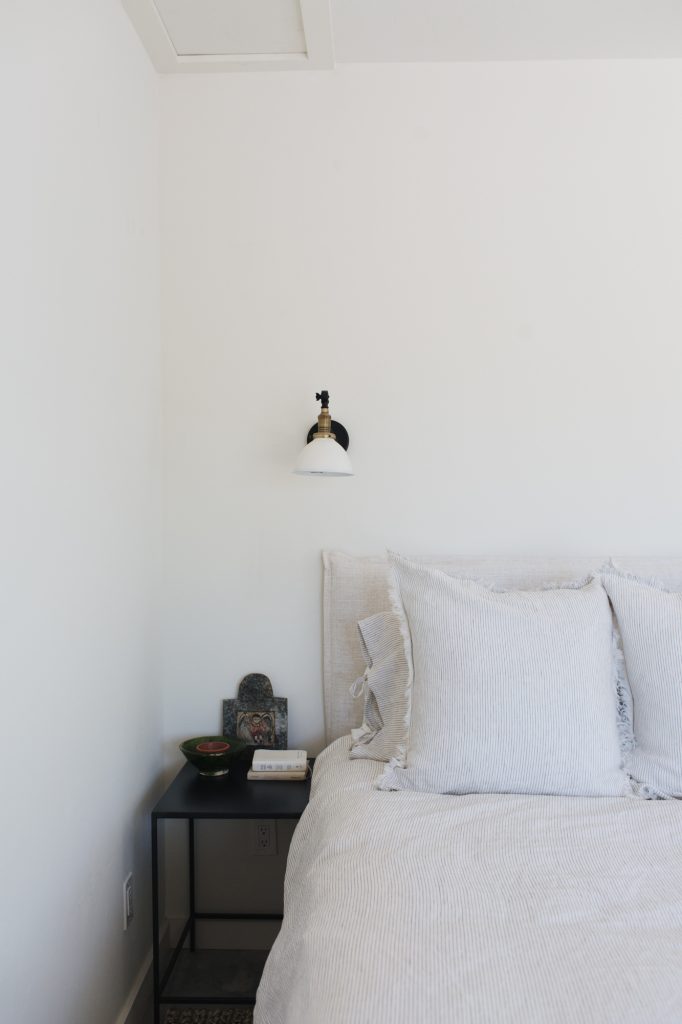For many parents, the idea of a good night’s sleep can often feel like a distant memory. Between feedings, diaper changes, playdates, and occasional tantrums, the ups and downs of parenting can really take a toll on one’s sleep cycle. Here’s the good news: By practicing a few key rules for sleeping well, that ever-elusive, well-rested wake-up can be yours again. With two toddlers of my own, I’m not sleeping the best these days, so it’s safe to say that the following sleep tips for parents couldn’t come at a better time.
Do any of you feel me? The irony of the situation is that, as a parent who is constantly on the go, you’d think that by the end of the day I’d be wiped out and fall asleep in a heartbeat. Nope. As a parent, it’s easy to be in a constant state of fight or flight–we always have so much going on that it can feel impossible to truly rest. To make things even more complicated, in the chance that my body allows me to fall asleep at a reasonable time, staying asleep can be yet another challenge. Sometimes, even if I have nothing to be worried about and I’ve set myself up for sleep success, along comes the racing thoughts. The anxiety in question? If I don’t fall asleep fast, the next day will be ruined.
For some time now, I’ve been looking for ways to get proper sleep. Because I imagine other parents out there must be feeling the same, I got in touch with the best person to help: sleep coach Kelly Murray. Keep reading for sleep tips that’ll support any parent—new and experienced alike.
Feature image by Nikole Ramsay.



When it comes to a good night’s sleep, where should we start?
The first step to balancing your sleep schedule is understanding the key hormone that keeps us awake: cortisol. An excessive amount of cortisol can make it hard to fall asleep. Some common cortisol boosters are stress and overactivity—both of which, of course, parents know well.
It’s easier said than done, but balancing your activity and stress levels will help you sleep better at night. According to Murray, taking a break when your child is asleep instead of checking off another task is a great way to make this happen. (Those dishes can wait!). This can include anything from sitting on the couch in silence, reading a book, calling a friend, going for a walk, or really anything that’ll help you feel relaxed.
Another stress-reducing tip is taking a minute to meditate. While it might be hard finding 20 minutes to disconnect and unwind, if you have a few moments alone, try a micro meditation (even a minute can do a world of good). It might not seem like a lot, but a little breathing goes a long way.


What role does diet play in our sleep quality?
What you eat impacts your ability to fall asleep. Did you know that low blood sugar boosts cortisol levels? Because of this, it’s crucial that parents are eating three balanced meals a day. Easier said than done, I know. My husband and I regularly graze at the kitchen island while our kids are eating rather than actually sitting down for a proper lunch. But making the effort to plan out our meals in advance has really helped.
Riding the blood sugar roller coaster interrupts your sleep and will cause you to wake up during the night. But reminding myself of the following truth has transformed my ability to prioritize a sleep-healthy diet: If I can find the time to make sure my kids are getting all the nutrients they need, I can do the same for myself.
Another pro tip? Murray suggests writing out tomorrow’s to-do list before you go to sleep. Doing this helps you get tomorrow’s anxieties out of your head so they’re not keeping you up at night. Thinking about recommitting to your journaling practice? Bedtime is the best time!
Now that we’ve gotten to sleep, how do we ensure we stay asleep?
Falling asleep is one thing, but staying asleep can be a completely different challenge. We’ve all been there—jolting up at 3 a.m. only to realize you have hours before your day begins. The typical response? Panic. The exact opposite of what we should be doing? Panicking.
If you often wake up in the middle of the night, try your best to stay calm. Prepare a mantra for yourself (something like “I am still asleep, I am still resting”) to talk yourself back to sleep. If you just can’t go back to sleep, Murray recommends getting out of bed to do something relaxing. This can include curling up with a book or writing in a journal (see the tip above!).
While you’re going through this process, be sure to listen to your body. When you feel tired again, try getting back into bed and going to sleep. As someone who regularly wakes up filled with anxiety, I found this tip extremely helpful. Now, I calmly get out of bed without any guilt. I also don’t jump to the conclusion that I won’t be sleeping that night.


What steps should a healthy sleep routine include?
In order to get a good night’s sleep, it can be beneficial to stay on top of the following:
- Power down your phone and turn off any electronics at least an hour before bed. And if you have a TV in your bedroom, time to take it out!
- Practice a relaxing bedtime routine. Try reading a book, meditating, or anything that will help you calm down.
- Keep your bedroom cool, dark, and quiet. Remember: Your bedroom is your sleep sanctuary.
Let’s not forget the sleep aids we all hear about. Murray says there’s a time and a place for them. Our bodies should naturally be able to fall asleep with the right preparation. Taking melatonin, for example, can be great for shift workers or if you’re experiencing jet lag. But to depend on it in order to sleep is a disservice to your body’s natural abilities. A nighttime, relaxing tea can be effective as well, plus most of the ingredients are natural and low-risk. However, it’s important to consult your doctor before adding supplements to your routine.
Last but not least, medications like Benadryl certainly do work to knock you out, but they will not help restore your sleep cycle. They can also be addictive, so it’s best to avoid them if possible.
What’s the most important thing to remember that can improve our sleep?
It’s just a fact: Managing your sleep as a parent can be stressful. My first baby, who had acid reflux, was up all night for almost nine months. That experience had a significant impact on my mental health. Best piece of advice? Remember that this is just a phase and it will pass. If you have a partner, divide and conquer when it comes to monitoring your kids. And be sure to give yourself grace when it comes to determining sleep success. It’s nearly inevitable—you’re not going to get those eight hours you’re used to. If you’re able to get five hours of continuous sleep a night, you’re on the right track.
If you or someone you know is struggling with sleep and have tried just about everything, don’t hesitate to reach out to your physician or therapist for additional help. A night of good sleep is a foundation to your performance as an individual and as a parent. We all deserve to make rest a priority.
Are you a new parent? We’d love to hear what tips and tricks have helped you get a good night’s sleep.






